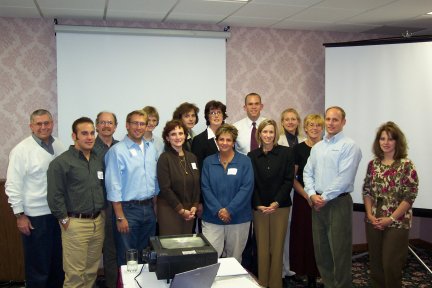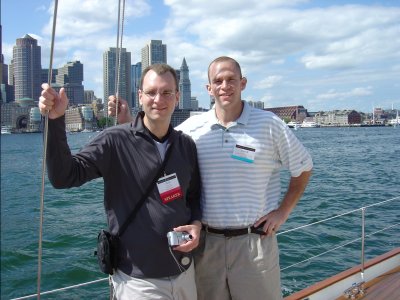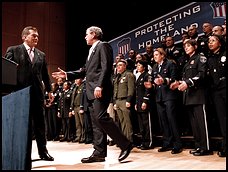September 30, 2003
Microsoft's Entry into the Anti-Virus Market Has Rivals Spooked
A short entry today about Microsoft's ability to "embrace and extend" Windows into the AV market - check out the article by BusinessWeek here - largely because one of its chief competitive weaknesses lies in Windows' battered reputation for being an easy target for viruses. Here's an excerpt:
- ...since Microsoft's (antivirus) products probably will be bundled into Windows, it will have a big advantage. Few believe that including antivirus software in Windows will violate antitrust laws. What potential rivals fear is that Microsoft will use its market power to thwart them. "The question is, will they play fairly or will they abuse their monopoly position?" asks Symantec CEO John W. Thompson. He and other rivals know they are facing a force more ominous than any virus. "When Microsoft enters an industry and includes the software in Windows, the sector disappears," says Steve Chang, CEO of antivirus software maker Trend Micro (TMIC ) Inc. It's a lesson the software industry knows all too well.
- Arik
September 29, 2003
Fees & Surcharges Replace Selling Price as (Apparent) Sole Means of Corporate Profitability
I was wondering where all the inflation had gone to lately – jettisoned with any pricing power in a post-recession jobless recovery, perhaps?
Not hardly! In a great BusinessWeek piece ("Fees, Fees, Fees"), we learn that customer fees and surcharges are the real engine of profitability at far too many (mostly big) businesses… Is this just deceptive marketing, or a way for everyone from banks to airlines to telephone companies to stay in business in the Internet era where everything’s a commodity, price transparency makes for powerful consumers and competitive differentiation is hard to come by?
My opinion: it's a rip-off to pay $100 change fee to switch a flight, $2.50 to use an ATM, or pay $4 bucks a gallon to get my rental car refueled... and don't even get me started on my phone bill!
My prediction: upstart competitors will use the consumer backlash against surcharges as a real differentiator for themselves, to the detriment of their larger competitors.
- Arik
September 26, 2003
Business Wargaming in Milwaukee with SCIP & KappaWest

The Milwaukee, Wisconsin Chapter of the Society of Competitive Intelligence Professionals - for which I serve as its humble chapter coordinator - met at the Four Points Sheraton at Mitchell Field International Airport to participate in a three-quarter day "Business Wargaming" session, led by workshop facilitator Tim Smith (second from right above) from KappaWest.
And, as expected, the two-person teams got fully engaged in the "live" round in the afternoon, competing for "Market Power Units" (MPUs) to see which team had the superior planning and execution skills in our hypothetical market scenario.
If ever given the chance to participate, don't pass it up - it'll be a great time had by all. If you'd like to learn more about KappaWest, reach its President, C.J. Kurtz, at his West Coast office at +01-949-859-8120. I highly recommend it!
- Arik
September 21, 2003
Frost & Sullivan CI & Market Research Conference in Boston

The picture depicts a couple of soon-to-be-sunburned Aurora staff out for a day of sailing on Boston Harbor (courtesy Frost & Sullivan, which was producing a CI/MR conference this week in Boston), taken Sunday 21 September 2003. My "baby" brother Derek is on the right – he’s Executive Director of Aurora’s Recon Intelligence Outsourcing Bureau (i.e., our research & analysis business) – and the one on the left is me... I know, it’s a rough life. But, I have to say, this was a great time – Boston had a great week lined up for a CI conference, despite narrowly missing the hurricane that slammed the Carolinas late the previous week. Postseason baseball fever was peaking as the Boston Red Sox were thinking of making a realistic run at a berth in the World Series, potentially putting them up against another perennial favorite, the Chicago Cubs. So, competition was in the air.
In prepping for the conference, I’d produced an interview piece with three of Frost’s conference faculty - Diana Mastel (from Toys R Us), Brian Bonazzoli (from Hewlett-Packard) and Wayne Rosenkrans (from AstraZeneca) that I heard from many of you out there was excellent – well, that’s the easiest way to be a decent writer – that is, do an amalgam interview piece where you don’t actually have to write… but seriously, thanks to Diana, Wayne and Brian – great seeing you all in Boston and nice job with your respective presentations as well!
I spent the week with clients for the most part – sorry everybody, I’m starting a "World Tour" here in the next few weeks, so it’ll take some time for me to follow up with you. Finally, on Wednesday, as the conference wound down after three pretty sensational days of presentations and networking, I wrapped up the week moderating the Vendor-Audience Crossfire Panel on Intelligence Software with three vendors on one side and three CI software users on the other. We only had 45 minutes, but hammered through almost a dozen questions in that time – everything from the role of the IT department… to how much you should spend on CI software… to which apps are the best for particular intelligence needs. It was a TON of fun and big thanks go out to Ken, Merrill, Paul, Mike, Jordan and Richard.
Hope to see you back at the next F&S CI event – somewhere on the East Coast (TBD) 16-20 May 2004. Derek’s got a trip report online as well in October’s Recon CI Newsletter.
- Arik
September 16, 2003
Women's United Soccer Folds, but Revival Seems Likely if USA Does Well at World Cup
 In what came to many as something of an anti-climax, the WUSA - the fledgling American women’s professional soccer league, formed three seasons ago after the 1999 victory by the USA in the women’s World Cup – folded this week, drawing into question not only whether women’s soccer can survive and thrive, but whether there’s really a market for women’s professional athletics in the U.S. at all.
In what came to many as something of an anti-climax, the WUSA - the fledgling American women’s professional soccer league, formed three seasons ago after the 1999 victory by the USA in the women’s World Cup – folded this week, drawing into question not only whether women’s soccer can survive and thrive, but whether there’s really a market for women’s professional athletics in the U.S. at all.
Still, at a time when the WNBA and women’s tennis are also languishing, it’s arguable whether the sports story of the year was Annika Sorenstam’s qualifying in the men’s PGA tour for the first time ever. NPR’s Talk of the Nation had a fabulous analysis of the state of women’s professional sports, the challenges it faces and how it might succeed. Give it a listen.
And, if U.S. women do well at the World Cup in the next few weeks, plus the dozens of other WUSA players for other countries, a new and revitalized league could make a big comeback next year!
- Arik
September 15, 2003
Apple Corps vs. Apple Computer: Fighting Over Music, Round Three

The Beatles management company said on Friday it is seeking a court injunction against Apple Computer Inc., insisting the computer maker's iTunes online music store breaches the band's trademark. Apple Corps is owned by Sir Paul McCartney, Ringo Starr (seen above), John Lennon's widow Yoko Ono, and the estate of George Harrison.
In February 1968, The Beatles, Ltd. changed its name to Apple Corps, Ltd. with subsidiary holdings as follows: Apple Electronics, Apple Films Ltd., Apple Management, Apple Music Publishing, Apple Overseas, Apple Publicity, Apple Records, Apple Retail, Apple Tailoring Civil and Theatrical, Apple Television (planned), Apple Wholesale (planned). Here's a few excerpted items on the matter from Yahoo news:
-
Apple Corps., the company formed by the Fab Four to manage its business interests and serve as the band's music label, issued a brief statement on Friday saying it had filed court papers in a London High Court in July seeking penalties and an injunction against the computer maker.
"Specifically, (the) complaint is made over the use by Apple Computer of the word "Apple" and apple logos in conjunction with its new application for downloading pre-recorded music from the Internet," the London-based company said in a statement.
The company did not elaborate on the penalties it is seeking, but said the computer maker violated a 1991 agreement specifying that it could use the Apple trademark for computer products only.
"Unfortunately, Apple and Apple Corps. now have different interpretations of this agreement and will need to ask a court to resolve this dispute," Apple Computer said in a statement.
Launched in April, Apple's iTunes has given hope to weary music executives looking for an alternative to free file-sharing services such as Kazaa and Morpheus, which have created a black market of sorts for free songs on the Internet.
Music executives blame file-sharing and CD-burning for contributing to a three-year decline in global recorded music sales. The Recording Industry Association of America this week announced it has sued 261 song swappers, a tactic that has drawn criticism from consumer groups.
Apple iTunes has been one of the few bright spots in the industry's attempt to woo back computer-savvy consumers.
Earlier this week, the company said it had sold 10 million song downloads in its first four months. Apple's iTunes is available only in North America to Apple computer users, a small sliver of the total personal computer market. However, Apple has said it is on track to deliver a version of the online music store for use on the ubiquitous Windows PC platform by the end of this year.
Apple has secured licenses from each of the five major music labels to sell music downloads, including EMI, home to The Beatles catalog. The Beatles, however, have not made their music available to iTunes or any other industry-backed service.
The stakes could be high: Apple's iTunes Music Store has sold more than 10 million songs at 99 cents each since its April 28 launch, and is central to Apple's strategy to promote its computers as digital entertainment hubs.
Despite Jobs' admiration of the Fab Four, still missing from the iTunes store are any songs from the Beatles. Apple Corps, which controls most of the Beatles' recordings, has traditionally been wary of releasing its music in new formats and has yet to authorize distribution on any Internet music site.
The London lawsuit is the latest legal spat between the two cultural icons. In 1981, the Beatles, who had released most of their recordings on the Apple label, sued Apple Computer over the corporate name. The case ended after the tech company paid the Beatles' company an undisclosed amount of money and agreed to only use the name for computer products.
A decade later, the Beatles sued again, alleging Apple Computer was violating the initial agreement by using its apple logo on music-synthesizing products. That case was settled out of court with Apple Computer again paying an undisclosed amount to the Beatles company and signing the agreement around which the latest lawsuit revolves.
Terms of the 1991 settlement were kept confidential, with Apple Computer allotting $38 million at the time to settle the litigation. Some think the latest case may lead only to a walk down penny lane. Charles Wolf, analyst with Needham & Co., predicted Friday that the two companies will settle if a judge doesn't throw out the lawsuit.
The Cupertino-based company is already paying hefty royalties to the five major record labels for the right to distribute their music online. It pays the labels an estimated 65 cents per song in addition to about 25 cents per song in other distribution and credit card processing fees. Wolf thinks the Beatles company would only manage to exact perhaps a half penny per song from Apple.
"They'll never stop the iTunes Music Store," Wolf said. "The point of the suit is to collect money and they won't get any money if they cut off the store."
Wolf thinks Apple Computer's lawyers must have considered the Beatles agreement prior to the online music store launch. "They named it the 'iTunes Music Store,' right?" Wolf said. "They must have thought about this because (the name) 'Apple Music Store' has more brand equity."
The Beatles' holding company has always been diligent in protecting its property and trademark. In addition to the computer company, Apple Corps has sued others over domain names and unauthorized use of the Apple logo.
Its latest case against Apple Computer will hinge on the details of the 1991 agreement, said San Francisco lawyer Eric Sinrod of Duane Morris LLP, who specializes in intellectual property and information technology.
"The devil is in the contractual details and how restricted Apple Computer is in terms of using its trademark," Sinrod said. "Since the online music space is an area where many people are trying to grab territory now, this could be a situation of an aggressive fight."
It's unlikely that either Apple company envisioned at the time of their deals today's digital revolution of music — how consumers can store thousands of songs on their computers or portable music players, including Apple Computer's iPod, and how they can buy songs with the click of a button, such as through the iTunes Music Store.
The Beatles sued and won another lawsuit when Apple shipped computers that allowed music to be played through attachable speakers. That lawsuit charged breach of a trademark agreement since Apple had agreed to steer clear of the music business. Fox News estimates Apple has paid US$50 million in the lost suits so far.
This latest round of legal proceedings surround Apple's popular MP3 player, the iPod and the iTunes Music Store, which just sold its 10 millionth song online.
"When it first happened with the iPod, we said, "What could they be thinking?" said a Beatles legal insider, who agreed that posters announcing the iPod from "AppleMusic" were among the most egregious violations. "They knew we had the agreement, and that we'd won a lot of money from them already."
It would seem that Apple's destiny is intertwined with that of it's erstwhile brand competitor, whether anyone identifies Apple Corps with The Beatles or not.
- Arik
September 12, 2003
Madison Ranked SI's "Best College Sports Town" - There's No Place Like the Home of the Badgers
 After yesterday's remembrances of sadness, I thought it'd be a nice time of year to commemorate traditions of a happier nature - like... COLLEGE FOOTBALL! And, I'm proud to acknowledge, Sports Illustrated has announced that my alma mater, UW-Madison, ranks the "Best College Sports Town" in the country! Woo-Hoo!
After yesterday's remembrances of sadness, I thought it'd be a nice time of year to commemorate traditions of a happier nature - like... COLLEGE FOOTBALL! And, I'm proud to acknowledge, Sports Illustrated has announced that my alma mater, UW-Madison, ranks the "Best College Sports Town" in the country! Woo-Hoo!
What does all that have to do with competition, you might be asking...? Well, because Madison BEAT Athens, Austin, Gainsville, Boulder, Bloomington, Eugene, Knoxville, College Station AND Syracuse! (Those were the rest of the Top 10.)
 Of course, two other significant rankings hit the papers in the past month or so.... First, UW-Madison ranked Number 7 among public universities in the annual ranking by U.S. News & World Report, hanging onto its rank as the seventh best public institution, tying with the University of California-San Diego, while falling one notch to tie for 32nd among all national doctoral universities. (Harvard and Princeton universities tied for first in that category.)
Of course, two other significant rankings hit the papers in the past month or so.... First, UW-Madison ranked Number 7 among public universities in the annual ranking by U.S. News & World Report, hanging onto its rank as the seventh best public institution, tying with the University of California-San Diego, while falling one notch to tie for 32nd among all national doctoral universities. (Harvard and Princeton universities tied for first in that category.)
And, of course, the Badgers were first runner-up in The Princeton Review's party school ranking - jumping EIGHT places from last year's 10th place finish. The University of Colorado-Boulder was the top party school, while Brigham Young University in Utah was the top "stone cold sober" school.
- Arik
September 11, 2003
As We Commemorate 9/11, Al Qaeda Threat Persists
 Coinciding with conclusions by U.S. District Judge Alvin Hellerstein against the aviation industry that the hijacking and crashing of a jetliner was a "foreseeable risk", America and the world mourned the 3,000 lives lost two years ago in acts of terrorism by suicidal extremists. The ruling opens the door to a possible rush of lawsuits from families of victims that died as a result of apparent negligence on the part of defendants American and United airlines, the Boeing Co. and the Port Authority of New York and New Jersey.
Coinciding with conclusions by U.S. District Judge Alvin Hellerstein against the aviation industry that the hijacking and crashing of a jetliner was a "foreseeable risk", America and the world mourned the 3,000 lives lost two years ago in acts of terrorism by suicidal extremists. The ruling opens the door to a possible rush of lawsuits from families of victims that died as a result of apparent negligence on the part of defendants American and United airlines, the Boeing Co. and the Port Authority of New York and New Jersey.
Hellerstein said that while terrorists had never flown airplanes into buildings before, "airlines reasonably could foresee that crashes causing death and destruction on the ground were a hazard that would arise should hijackers take control of a plane."
Elsewhere around the nation, memorials remembered those who died and those who acted to rescue others.
Still, other reports attest to Al Qaeda's "largely invisible but extensive presence in the United States that includes logistical support, recruiting and fund-raising operatives and financial conduits linking them to the terrorist organization's global network".
However, as the Washington Post reported, counter-terrorist efforts have made progress that might signal weaknesses, as evidenced by a decided shift in strategy by Al Qaeda in trying to open a front in Iraq:
- "Two years after the attacks on the United States, Osama bin Laden's leadership cadre has been isolated and weakened and is increasingly reliant on the violent actions of local radicals around the world to maintain its profile. But the al Qaeda network is determined to open a new front in Iraq to sustain itself as the vanguard of radical Islamic groups fighting holy war, according to European, American and Arab intelligence sources."
Likewise, the FBI has all but given up hope of infiltrating terror cells using traditional means:
- "The FBI has concluded that it may never be able to plant undercover agents inside al-Qaeda, and so agents are focusing more on recruiting terror operatives as informants and on continuing to get details from those already in custody."
 And, Homeland Security is still struggling to get a foothold since it was chartered back in March by merging 22 federal agencies and 170,000 employees:
And, Homeland Security is still struggling to get a foothold since it was chartered back in March by merging 22 federal agencies and 170,000 employees:
- "Six months after it was established to protect the nation from terrorism, the Department of Homeland Security is hobbled by money woes, disorganization, turf battles and unsteady support from the White House, and has made only halting progress toward its goals, according to administration officials and independent experts. The top two officials under Homeland Security Secretary Tom Ridge are stepping down amid criticism from some White House officials and elsewhere in the administration. So few people want to work at the department that more than 15 people declined requests to apply for the top post in its intelligence unit -- and many others turned down offers to run several other key offices, government officials said."
Yet, there's a profound sense that the problems that still plague us are not insurmountable. As we memorialize fallen brethren, I'm sure we're all reminded how fragile our lives and our economy can be, even while our country remains strong and resolute.
- Arik
September 10, 2003
WTO Opens in Cancun to Protest, Tragic Suicide, Agricultural Strife & Debate on Whether “Free Trade” Means “Fair Trade”

Under fire without and within, 146 trade ministers convened today in Cancun Mexico at the World Trade Organization's Fifth Ministerial to discuss everything from enforcing intellectual property (IP) rights for software, music and movies in the developing world to, the primary local issue for Mexicans, the disintegration of rural economies from NAFTA. All this, even while the European Union’s high court ruled European states could ban genetically modified foods, a big loss for American agribusiness, and the suicide of a South Korean farmer that cast a shadow over the event; here’s an excerpt from AlterNet:
- “A South Korean farmer, Kun Hai Lee, committed ritual suicide during the WTO's opening day to protest the organization's agricultural policies. Witnesses said Lee stood in front of police lines, declared that "the WTO kills farmers," and then slashed himself to death with a blade. His suicide came on South Korea's Day of the Dead. Few at the demonstration realized what had occurred until later in the day. As word slowly spread of the suicide, supporters of Kun Hai Lee vowed to protest his martyrdom throughout the coming week, possibly starting with a tent city at the barricades where the death occurred.”
The WTO issued a rather weak statement of “regret”, but took no responsibility for the man’s actions.
Indeed, anti-globalization protests were strong in this round, reminding us of the sometimes violent protests at the Seattle round in 1999. Another AlterNet excerpt reads, the “battle to impose genetically-altered crops on Europe has lost American agri-business $1 billion during the past five years. And $190 billion in U.S. farm subsidies has inflamed discontent from Brazil to Mexico.”
CorpWatch has good coverage of the agriculture issue - which really makes me wonder if the long-range planners are at all thinking about their collective future - and recasts the debate as a north-south conflict, with armies of farmers from developing nations demanding the WTO lay off agriculture:
- “However, if the north/south rift widens, tensions between Washington and the EU resurface and street protests heat up, negotiators will find themselves in the same volatile situation that derailed the WTO's Seattle round four years ago. Thousands of farmers have already taken to the streets in Cancun to demand the WTO stay out of agriculture. The rest of the debate will unfold behind closed doors as the trade negotiations progress this week.”
A good piece from BusinessWeek reiterates the stakes in this round as well - that the developed world versus the developing world presents such profound challenges to getting this right and fair for everybody.
Finally, NPR’s On-Point had a great audio piece on the growing disillusionment with the WTO process even in the developed world over the continued export of white-collar jobs to low-wage nations abroad:
- “If everyone from IBM to textile mills ships jobs overseas, what is left for American workers? If jobs chase low wages, does everyone end up poor?”
- Arik
=========
September 01, 2003
Labor Day 2003: The Betrayal of American Work
 On a day off for most of us here in the U.S., I was thinking about work in the modern world and what it means to us all... reminding myself of a new book - "The Betrayal of Work: How Low-Wage Jobs Fail 35 Million Americans" by Beth Shulman - I'd heard about on NPR recently, and recalling how it seems like more people are struggling to make ends meet today than there used to be in America.
On a day off for most of us here in the U.S., I was thinking about work in the modern world and what it means to us all... reminding myself of a new book - "The Betrayal of Work: How Low-Wage Jobs Fail 35 Million Americans" by Beth Shulman - I'd heard about on NPR recently, and recalling how it seems like more people are struggling to make ends meet today than there used to be in America.

 Echoing the themes described in (the much-better, in my opinion) "Nickel and Dimed: On (Not) Getting By in America" by Barbara Ehrenreich and "Fast Food Nation: The Dark Side of the All-American Meal" by Eric Schlosser, it reminds me that the critique of work as it exists for many Americans is by no means an "American Dream". For anyone interested in the future of work in the U.S., I think all three books make for a good left-of-center foundational bibliography that speaks to the greed of corporations and the hopelessness many feel about the future of their careers.
Echoing the themes described in (the much-better, in my opinion) "Nickel and Dimed: On (Not) Getting By in America" by Barbara Ehrenreich and "Fast Food Nation: The Dark Side of the All-American Meal" by Eric Schlosser, it reminds me that the critique of work as it exists for many Americans is by no means an "American Dream". For anyone interested in the future of work in the U.S., I think all three books make for a good left-of-center foundational bibliography that speaks to the greed of corporations and the hopelessness many feel about the future of their careers.
Since George W. Bush took office, more than 3 million jobs have been lost, including 2.5 million good-paying jobs in manufacturing, and the President announced in his Labor Day address to union workers in Richfield, Ohio the creation of a assistant secretary of commerce for manufacturing to try and stem the tide; even as he acknowledged that rising productivity means fewer jobs for Americans. Most of those jobs are essentially gone for good too - the result of structural changes in the economy. All this at the same time the Bush Administration is poised for a Senate vote on whether to allow Fair Labor Standards Act (FLSA) regulation that would let the Department of Labor permit business to end the right to overtime pay for more than 8 million Americans. Meanwhile, the Census Bureau reports that the number of Americans living below the poverty line increased by more than 1.3 million in 2002, to 34.8 million, or 12.4 percent of the population. Today some 20 percent of children under 5 live below the poverty line.
Maybe it's time to consider a Constitutional amendment guaranteeing a right to a living wage; an idea Martin Luther King proposed in the 1960s. That wouldn't do much to stem the exporting of jobs abroad, but might encourage debate at the WTO about a global living wage rule and tarriffs against countries that violate such a rule. Comparative advantage aside, the disillusionment many of us feel with offshore outsourcing, designed to insulate corporate profits at the expense of wages, is a trend that is set to intensify, even as the WTO is set to meet in a few days in Cancun, Mexico. American business calls it "staying competitive"; I think it amounts to erosion of disposable income for a stable market domestically.
In an era where, over the past 30 years, the productivity of our people has increased 66 percent while the median wage has gone up only 7 percent, I don't know that Labor Day 2003 is anything to celebrate, not without at least considering those alongside us that have little hope for a more prosperous future, even as those still hopeful find their jobs evaporating in the American middle class. This quote at AlterNet says it all: "As billionaire Warren Buffett said to ABC's Ted Koppel last month, 'If it's class warfare, my class is winning.'"
- Arik
 "Competitive Intelligence applies the principles of competition and lessons of intelligence to the need for enterprise awareness and predictability of market risk and opportunity. CI has the power to transform an enterprise from also-ran into real winners with agility enough to create and maintain sustainable competitive advantage."
"Competitive Intelligence applies the principles of competition and lessons of intelligence to the need for enterprise awareness and predictability of market risk and opportunity. CI has the power to transform an enterprise from also-ran into real winners with agility enough to create and maintain sustainable competitive advantage."
